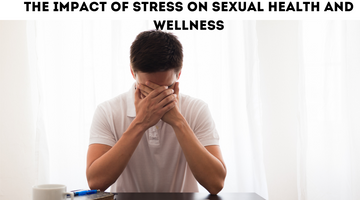
The human body responds to stress by releasing the hormone cortisol, which prepares the body to fight or flee. This response, known as the "fight or flight" response, can be helpful in short-term situations, but when stress is prolonged, it can cause negative effects on the body. High cortisol levels can impact the body's ability to produce other hormones, including testosterone and estrogen, which are important for sexual health and wellness.
In men, high levels of stress can lead to erectile dysfunction (ED). ED occurs when a man has trouble achieving or maintaining an erection. This can be caused by a variety of factors, including high levels of stress, which can affect the release of hormones in the body. Additionally, high stress levels can cause muscle tension, which can affect a man's ability to perform sexually.
In women, stress can impact sexual health and wellness by causing a decrease in libido, or sexual desire. Stress can also cause vaginal dryness, making sexual activity painful. Additionally, high levels of stress can lead to issues with arousal, causing difficulty with reaching orgasm.
Stress can also impact the quality of sexual relationships. When people are under high levels of stress, they may experience feelings of anxiety and depression, which can lead to a lack of intimacy and communication with their partner. This can result in decreased sexual satisfaction and a negative impact on the overall health of the relationship.
In addition to the physical effects of stress on sexual health and wellness, it can also have psychological effects. People under high levels of stress may experience anxiety and depression, which can lead to a decreased sense of self-esteem and body image. This can impact a person's confidence and ability to engage in sexual activity.
Stress can also impact sexual health and wellness indirectly by affecting a person's overall health and well-being. When people are under high levels of stress, they may engage in unhealthy behaviors, such as overeating, smoking, and drinking alcohol, which can have negative effects on their physical and sexual health.
In order to address the impact of stress on sexual health and wellness, it is important to practice stress management techniques. This can include exercise, mindfulness, and relaxation techniques such as meditation or deep breathing. Engaging in physical activity can help reduce stress levels and improve overall health, including sexual health and wellness.
In addition to stress management techniques, it is also important to maintain a healthy lifestyle. This includes eating a balanced diet, getting enough sleep, and engaging in regular physical activity. Additionally, it is important to communicate with your partner about any stress or sexual health concerns, as this can help improve the overall health of the relationship.
In conclusion, stress can have a significant impact on sexual health and wellness, and it is important to address this issue in order to maintain overall health and well-being. By practicing stress management techniques and maintaining a healthy lifestyle, people can reduce the negative effects of stress on their sexual health and wellness. Additionally, open and honest communication with a partner can help improve the quality of sexual relationships.




